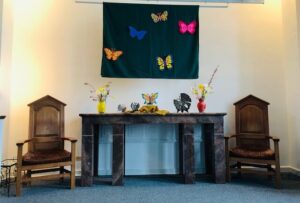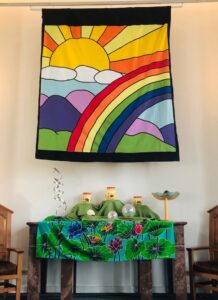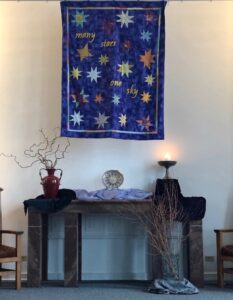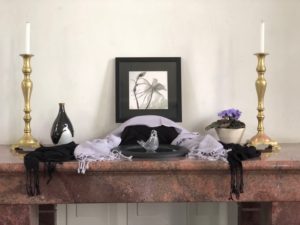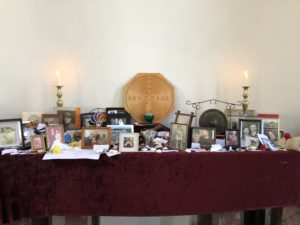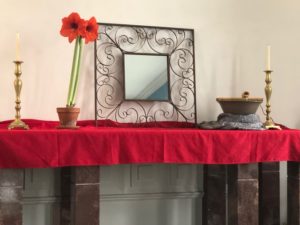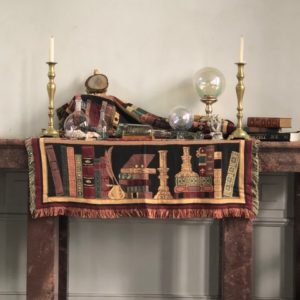Opening Words:
It is common in a great many Unitarian Universalist congregations for the settled preacher to offer what’s often called a “Question Box Sermon” – congregants write questions on index cards, which are then collected and which the preacher does her best to answer. I first encountered this practice in our congregation in Yarmouth, Maine, where it was known instead as “Stump the Minister Sunday.” It had become the tradition there to ask questions so complex, so erudite, or so niche that it was unlikely that the preacher would be able to answer. It was also a chance to have some fun. In my first year, for instance, I was asked for the average air speed velocity of an unladen swallow, to which I replied, “African or European?” (I have since learned that the average air speed velocity of an unladen European swallow, at least is roughly 11 meters per second, or 24 miles an hour.)
Fun though this was, I have always that these “Question Box Sermons” shouldn’t be a challenge to the congregation to come up with ever more esoteric questions for the minister but, instead, an opportunity for a congregation to “test” their ordained minister and to see how their mind works (in situ, as it were). In some of the schools within the Zen Buddhist traditions there is something known as “dharma combat. “ As I understand it, a student who is preparing to become a teacher comes before thesangha which then questions him to test the breadth of their knowledge and the depth of their understanding.
“Question Box Sermons” also provide an opportunity for both the ordained minister – and the congregation itself – to learn just what questions members are wrestling, or dancing, with. What’s on your minds? What questions, what concerns, what issues are “uppermost on your minds and deepest in your hearts”? What, if you could ask me anything, what would you ask?
One other thought: I have learned that the author Brian McLaren no longer offers Q&A sessions after his talks. He used to, but he no longer does. Instead, he now offers a time for “Q&R”. He’s said that he now realizes that he will have answers to people’s questions may be a little presumptuous– especially if they are deep and meaningful ones. Now he promises only to offer his most considered response.
The Questions:
- Why have Jews been hated/killed/ostracized for millennia? (Including, of course, in many quarters now?)
- From a religious perspective, what does “community” mean?
- Finding a place? Finding a passion?
- Help me to learn to pray, please.
- I am trying to find my space in this liberal religion, where there are more questions than anything else. Where do I start?
- You love superheroes. What is a superhero with a particularly spiritual lesson?
- How do we discourage harmful “group-think” bandwagons?
- How do we explain the evil in the world, such as terrorism, to our young children?
- I’m 77. My grandchildren are grown. What do I do with the rest of my life?
- What was your most spiritually fulfilling moment?
- What is your least favorite thing about Unitarian Universalism?
- Sometimes there are questions that ministers wish they were asked. Is there a question you wish to be asked and to answer?
- Define “prayer.”
- How do you discern when a decision is selfish or healthy self-care? Particularly regards limiting contact with family members with mental health issues?
- As an atheist, with no belief in an afterlife, reward or punishment (eternal or otherwise), what is the point of being virtuous or “good”?
Those were the questions I was able to answer during the service. Here are the rest:
- It breaks my heart to see the dissension here these days. How can we come together again — respecting our differences and honoring mutual love again?
- What can Unitarian Universalists learn from Christianity (or from Jesus) that can help guide our lives?
- How do different religions in the world offer support for those who are persecuted?
- We love TJMC and all who work in it so arduously. Is it possible that the anxious disunity fostered by current political establishment might undermine Unitarian Universalist’s attempt to unify everyone?
- How do you stay in community with family members who have racist views?
- Where can I find hope or joy? I used to find them in nature. Now I am saddened by man’s destruction of the earth. I used to have faith in the goodness o humans. It is overshadowed by evil. How do we face despair?
- In this world, this hurting world, both large and in my small world, where the needs are huge and often conflicting, how do I choose where to put my energy, and how do I find peace in myself in the midst of so much?
- How much would could a woodchuck chuck if a woodchuck could chuck wood?
- Is he church available for hosting U.S. Chess Federation sponsored chess tournaments (on occasional weekends)?
- “Love” and “Spirituality,” are they the same thing?
- How does racial justice work and social action affect you in your day-to-day life?
- I once heard a minister say that Unitarian Universalists do not believe in an afterlife. Is this a universal doctrine for UUs? I want to believe that there is something next!
- Please translate your closing words. Thank you.
- Why do so many choose to follow religious beliefs based on impossible miraculous and likely mythical events, rather than use critical reasoning to form their belief systems?
- Why does racism exist in Charlottesville? Or anywhere?
- Why is music an important part of many different religious services?
- How can I soothe myself and others when there is so much pain in our world?
- How can we deal, spiritual, with our sense that this country is heading into an existential crisis?
- What hymn do you love or think is particularly meaningful?
- How do we encourage more volunteers?
- Would you be willing to take a pay cut to stay?
- Could we have more music?
- Tell me just shy I am here when Tiger Woods and Jordan Spieth are both in contention at the British Open?
- What would you like us to know about the many challenges of [being] lead minister?
- When your child (who is 6) asks you if there is a god, and her parents don’t agree on the answer, how do you answer her? Explain how Unitarian Universalism can help her figure it out?
- What can an atheist say as a pre-meal “grace” when asked to do so by conventionally religious persons?
A lot of really good questions, no? I’ve never done this before, but I think that I will write responses to these on this blog over the next several weeks. Stay tuned!
Closing Words:
For closing words how could I not offer this well-known passage from Rainer Maria Rilke’s 1903 book, Letters to a Young Poet:
“…I would like to beg you dear Sir, as well as I can, to have patience with everything unresolved in your heart and to try to love the questions themselves as if they were locked rooms or books written in a very foreign language. Don’t search for the answers, which could not be given to you now, because you would not be able to live them. And the point is to live everything. Live the questions now. Perhaps then, someday far in the future, you will gradually, without even noticing it, live your way into the answer.”
Pax tecum,
RevWik
Q: Help me learn to pray, please.
A: Given that I’ve literally written a book on prayer, this feels something like a softball. (Simply Pray: a modern spiritual practice to deepen your life, Skinner House Books, 2005.) Yet before responding to this question specifically, I want to pull back and address the larger issue of “spirituality.”
I think that the heart of “spirituality,” shorn of any particular theological overly, is the universal observation that there are, let’s say, two ways of living — living in such a way that we are truly and deeply alive, and, well not that. Our Unitarian Transcendentalist ancestor Henry David Thoreau wrote in his classic book Walden that he wished to live in such a way that when he came to die he would not discover that he had not lived. (That’s a rough paraphrase.) And this sense that there are two kinds of living can be found in nearly every religious tradition we humans have developed — alive and dead, living in sin and living in the spirit, deluded and enlightened, asleep and awake. I could go on, but probably don’t have to. “Spirituality,” then, has to do with this living life rather than not-life. This would mean that spiritual practices — like prayer — are tools to use in the effort to be alive.
How, then, do you pray? I’d say that we should pray in the way that “works” for us. It’s not necessary to believe in some anthropomorphic deity with whom we “talk.” It’s not necessary for “prayer” to involve “talking” at all — either externally or interiorly.
I’ll digress here to make a plug for another book project I’ve been involved with. In 1999, Skinner House Books published the ground-breaking Everyday Spiritual Practice: simple pathways for enriching your life. It’s an anthology which offers an extremely wide variety of understanding of just what could justifiably be called a spiritual practice. Earlier this year, Skinner House Books published something of a successor — Faithful Practices: Everyday Ways to Feed Your Spirit. I was honored to have been the editor for this anthology, which includes examples of spiritual practices as wide ranging as sitting zazen, blowing bubbles, walking through your neighborhood, chopping vegetables, playing roller derby, and “playing” with action figures. (Guess who wrote that chapter?)
To learn to pray, then, in it’s most expansive understanding, is to (again) feel your way to the answer. What are you doing when you’re feeling most alive? Most connected to the universe? I’d say that you could call that “prayer” and that, after defining it that way, paying attention to how your experience of it might change.
[If, of course, this question was actually a specific request for help in learning to do the “talking to” kind of prayer, this response may not have been at all helpful. I would, somewhat modestly, recommend my book as one resource. There are many others I could suggest, and I know that I would be glad to talk with you directly if this is your question. (Whether you actually wrote this question or not.)]I am trying to find my space in this liberal religion — where there are more questions than anything else. Where do I start?
I’ll begin my response by saying that, properly understood, Unitarian Universalism is filled with lots of answers as well as questions. It should! What would be the point of asking questions if we were never to find an answer to them? That said, our faith tradition encourages us to hold on to the answers we’ve found … lightly. We’re encouraged to be willing to let them go when new experiences lead us to new ways of thinking. There are two quotes I love which speak to this. The first comes from someplace I’ve never known, “if you’re not willing (or able) to change your mind, how do you know you still have one?” The other, which I just heard a week or so ago, comes from the Trappist monk, Thomas Merton. He once wrote, “If the you of five years ago doesn’t consider the you of today a heretic, you’re not growing spiritually.”
All that said, I think it’s important to remember that there are not set answers for you to find. Unitarian Universalism invites us to look to our own lives as “sacred scriptures,” as full of depth and meaning as any text revered by one of the world’s great religions. I’ve often said that for UUs, “experience precedes theology.” I mean that, in a great many other traditions, we are told what, for instance, God is like, and are then encouraged to go out and look for experiences of that in our lives and in the world. We, on the other hand, invite us to first look to our own lived experiences to identify what we would consider “sacred” or “holy” (whether or not those are the words we’d use). Then, after discovering our own experience, we can apply more traditional religious language, or not. (I once wrote what I think was a pretty good sermon about this. I’ll see if I can find it, and I’ll post it here sometime in the future.)
Well … those two questions took up a lot of space, so I’ll hold it here for today and come back tomorrow with more responses to more questions.
You love superheroes. What is a superhero with a particularly spiritual lesson?
I’ve just started reading what promises to be a fascinating book, The Caped Crusade: Batman and the Rise of Nerd Culture, by Glenn Weldon. (Simon & Schuster, 2017). I heard about the book when an article appeared on my newsfeed titled, “Meet the Professor Who’s Going to Teach a College Course All About Batman.” In that interview, the professor, Steven Levya of the University of Baltimore, talked about how Weldon’s book had really inspired him to develop the course. Part of Weldon’s premise is that, besides being a human with no extraordinary super power, the Batman is also different from his heroic colleagues in at least one other way — over the years he has changed.
Superman, for instance, over his more than 70 year run has always been basically Superman, “the Big Blue Schoolboy.” His personality, his way of being in the world has been pretty constant. So too, let;s say, Spider Man, who has been almost invariably angst-ridden. Batman, on the other hand, has been depicted in numerous ways, from the campy portrayal of Adam West in the TV show of the 1960s, to the quasi-fascist of Frank Miller’s seminal (and truly awesome) The Dark Night Returns. He has been unshakably self-assured, and neurotic as all get out. And to a large extent, the various version of the Caped Crusader can be seen as reflecting the zeitgeist of the times.
Yet the many moods of the Batman can also be viewed as a mirror we can hold up to ourselves, for we’re also filled with more than one version of ourselves. As Whitman famously wrote, “Do I contradict myself? Very well then, I contradict myself. I am large, I contain multitudes.” So the Batman shows us a hero with no special powers (except, perhaps, his fortune), who is able to overcome virtually any obstacle placed in this path, even while expressing a panoply of possible selves, a person who, like us, “contains multitudes.”
How do we prepare for August 12th?
This is a hard one, because each of us had our own experiences of last August 12th which we’ll be bringing to this August 12th. And none of us know exactly what is going to happen — there are no planned events like the “Unite the Right” rally, yet it is virtually certain that there will be some kind of hate-fueled presence. It is likely that there’ll be more than one “spontaneous” action popping up without (at least much) warning. So … how do we prepare when we’re not really sure what we’re preparing for?
I’d say that one think we can do is double down on whatever it is that connects us to “that inner place of peace” and that outer experience of connection to others and to all that is. Call it Love, call it Community, call it The Interconnected Web of All Existence — call it God, if you wish — yet what we call it is not as important as being intentional about feeding ourselves with it. For love to conquer hate we must do all that we can to be in touch ourselves with that Love (“known by many names yet by no name fully known”).
It’s also really important to remember that we are always stronger together than we are alone. There a whole lot of people throughout Charlottesville who are also trying to figure out how best to prepare for this date — both the way it will bring up memories of the past, and whatever may happen this year. The Charlottesville Clergy Collective is offering a number of events leading up to, and on, August 12th. (We have them listed on our website.) There’s also the #resilientcville website, the city’s effort to inform people of the constructive things being planned. Congregate Charlottesville, a group that began as a subset of the Clergy Collective membership and which favors nonviolent direct action, has also been making plans for the 12th of August. Each of these, all of these resources offer ways to connect with, and be with, others both as that anniversary approaches, and on the day(s) itself.
Our congregation is going to be proactively organized than we knew to be last year. We will be asking people who plan to participate in one or more of the events to let our leadership know so that we can spread the word — “There’ll be a group of UUs meeting at such-and-such a time, in such-and-such a place. Contact so-and-so for more information.” This way folks can know that they do not participate alone, even in the midst of a crowd.
One last thought — it may take a long time, it may not seem as though it is true, but love is always stronger than hate. Always.
Pax tecum,
RevWik



